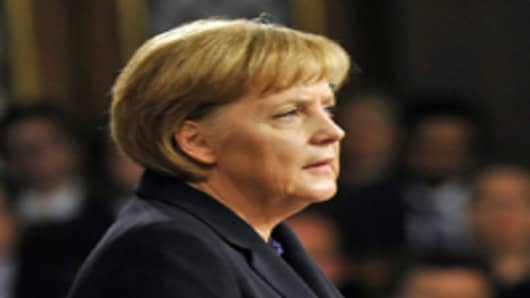When George Papandreou, the Greek prime minister, this week aired frustration with Germany for pushing the eurozone to the brink of another debt crisis, he was saying publicly what other senior European officials and diplomats have been saying privately for weeks.
The drive by Angela Merkel, the German chancellor, to rewrite the European Union’s treaties to set up a new bail-out system for future Greek-like collapses – and her insistence that private investors bear more of the cost of such rescues – was quietly resented when she bulldozed it through last month’s summit of EU leaders.
But as bond markets have reacted and plummeted in the weeks since, that resentment has begun to boil over, with increasing accusations that Ms Merkel has put many of her fellow eurozone leaders in untenable positions in order to reinforce her own standing with German taxpayers.
“They’re unprintable at times,” said Daniel Gros, director of the Brussels-based Centre for European Policy Studies, of the angry remarks he has heard aimed towards Berlin.
German officials insist their campaign to get private bondholders to shoulder more bail-out costs is not just about domestic considerations.
The government is more concerned that the current system – which condemns well-managed states to bailing out badly-managed ones – is unsustainable. But even some of those well-managed states have expressed anger at German tactics.
Countries such as the Netherlands, Finland and Austria, all normally allies of Germany in economic governance issues, have raised questions about Berlin’s behaviour.
Anger first arose after Berlin cut a deal in mid-October with France over the new bail-out system, even as it was working closely on economic reform issues with several of its allies among the northern, fiscally prudent caucus.
Ever since the deal was struck, Germany has slowly lost support for its hardline stance on the new rescue mechanism and has been forced to back away from its original ideas about setting strict rules for private investors’ role in a bail-out “ex-ante”, or before a rescue even occurs.
“Everybody should be more [of] an owner of this process; it shouldn’t just be Germany,” said Mikolaj Dowgielewicz, Poland’s EU minister.
Senior EU officials have become increasingly alarmed by the internecine sniping. Olli Rehn, the EU’s top economic official, on Tuesday called for leaders to “restore the sense of unity” and to end the “somewhat divisive tone in the public debate”.
Several European officials said, however, that Germany was unprepared for the market’s angry reaction to the bail-out proposal and has since begun to backtrack.
Two senior officials briefed on deliberations during the G20 summit in Seoul said a statement put out there by finance ministers of the EU’s five largest economies, in which they reassured bondholders that no current owner of debt would be forced to pay for a sovereign bail-out, was in part a concession by Berlin that it had overplayed its hand.
Mr Gros noted the current dust-up is the second time Ms Merkel has pushed the eurozone into turmoil by digging in her heels on what, to her, is a principled stand against bailing out profligate member states.
Earlier this year, Ms Merkel refused for months to offer concrete help for Greece until forced into action in May by an angry bond market.
“That is the fundamental flaw in Merkel’s approach,” Mr Gros said. “What she somehow doesn’t get is that markets are not like political systems. They anticipate things. And they anticipate vaguely, not rationally.”
As the turmoil has gathered steam, German officials have insisted they are sympathetic with Ireland’s plight, particularly since Dublin was the first “peripheral” EU economy to slash budgets to try to get its fiscal house in order.
Berlin has repeatedly insisted that they are not putting pressure on Ireland to accept EU aid. At the same time, Berlin has grown frustrated with Dublin’s handling of the crisis, believing Irish officials have failed to inform other eurozone members how they want to move forward.
But Berlin appears prepared to tough it out, despite the criticisms from the likes of Mr Papandreou and Jean-Claude Trichet, the European Central Bank president who loudly opposed the German move to reopen the treaties for fear that the markets would react exactly as they have.
German officials acknowledge that uncertainty over the future bail-out system is not ideal, but they insist they need more time to work out its details.
Additional reporting by Joshua Chaffin, Quentin Peel and Ben Hall


